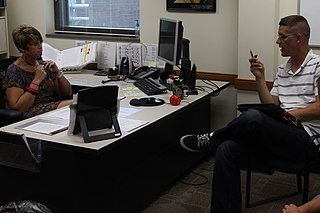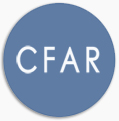Related Research Articles

A profession is a field of work that has been successfully professionalized. It can be defined as a disciplined group of individuals, professionals, who adhere to ethical standards and who hold themselves out as, and are accepted by the public as possessing special knowledge and skills in a widely recognised body of learning derived from research, education and training at a high level, and who are prepared to apply this knowledge and exercise these skills in the interest of others.
Psychotherapy is the use of psychological methods, particularly when based on regular personal interaction, to help a person change behavior, increase happiness, and overcome problems. Psychotherapy aims to improve an individual's well-being and mental health, to resolve or mitigate troublesome behaviors, beliefs, compulsions, thoughts, or emotions, and to improve relationships and social skills. Numerous types of psychotherapy have been designed either for individual adults, families, or children and adolescents. Certain types of psychotherapy are considered evidence-based for treating some diagnosed mental disorders; other types have been criticized as pseudoscience.

A psychologist is a professional who practices psychology and studies mental states, perceptual, cognitive, emotional, and social processes and behavior. Their work often involves the experimentation, observation, and interpretation of how individuals relate to each other and to their environments.
Counseling psychology is a psychological specialty that began with a focus on vocational counseling, but later moved its emphasis to adjustment counseling, and then expanded to cover all normal psychology psychotherapy. There are many subcategories for counseling psychology, such as marriage and family counseling, rehabilitation counseling, clinical mental health counseling, educational counseling, etc. In each setting, they are all required to follow the same guidelines.

The Quality Assurance Agency for Higher Education, usually referred to simply as the Quality Assurance Agency or QAA, is the UK higher education sector's independent expert quality body, with a remit to maintain and enhance the quality of teaching and learning in tertiary education in the UK and beyond. It conducts quality assessment reviews, develops reference points and guidance for providers, and conducts or commissions research on relevant issues.

Certification is part of testing, inspection and certification and the provision by an independent body of written assurance that the product, service or system in question meets specific requirements. It is the formal attestation or confirmation of certain characteristics of an object, person, or organization. This confirmation is often, but not always, provided by some form of external review, education, assessment, or audit. Accreditation is a specific organization's process of certification. According to the U.S. National Council on Measurement in Education, a certification test is a credentialing test used to determine whether individuals are knowledgeable enough in a given occupational area to be labeled "competent to practice" in that area.

The Council for Higher Education Accreditation (CHEA) is a United States organization of degree-granting colleges and universities. It identifies its purpose as providing national advocacy for academic quality through accreditation in order to certify the quality of higher education accrediting organizations, including regional, faith-based, private, career, and programmatic accrediting organizations.

The Financial Reporting Council (FRC) is an independent regulator in the UK and Ireland based in London Wall in the City of London, responsible for regulating auditors, accountants and actuaries, and setting the UK's Corporate Governance and Stewardship Codes. The FRC seeks to promote transparency and integrity in business by aiming its work at investors and others who rely on company reports, audits and high-quality risk management.
Supervision is used in counselling, psychotherapy, and other mental health disciplines as well as many other professions engaged in working with people. Supervision may be applied as well to practitioners in somatic disciplines for their preparatory work for patients as well as collateral with patients. Supervision is a replacement instead of formal retrospective inspection, delivering evidence about the skills of the supervised practitioners.
Licensed Professional Counselor (LPC) is a licensure for mental health professionals in some countries.

Internal auditing is an independent, objective assurance and consulting activity designed to add value and improve an organization's operations. It helps an organization accomplish its objectives by bringing a systematic, disciplined approach to evaluate and improve the effectiveness of risk management, control and governance processes. Internal auditing might achieve this goal by providing insight and recommendations based on analyses and assessments of data and business processes. With commitment to integrity and accountability, internal auditing provides value to governing bodies and senior management as an objective source of independent advice. Professionals called internal auditors are employed by organizations to perform the internal auditing activity.
The British Association for Counselling and Psychotherapy (BACP) is a professional body for counsellors and psychotherapists practising in the United Kingdom.
A licensed clinical professional counselor (LCPC) is a professional who has been qualified to provide psychotherapy and other counselling services. LCPCs are trained to work with individuals, families, and groups to treat mental, behavioural and emotional problems and disorders. The main goal of LCPCs is to use counselling strategies to help people live a more satisfying life, which typically involves identifying a goal and finding potential solutions.
A professional degree, formerly known in the US as a first professional degree, is a degree that prepares someone to work in a particular profession, practice, or industry sector often meeting the academic requirements for licensure or accreditation. Professional degrees may be either graduate or undergraduate entry, depending on the profession concerned and the country, and may be classified as bachelor's, master's, or doctoral degrees. For a variety of reasons, professional degrees may bear the name of a different level of qualification from their classification in qualifications, e.g., some UK professional degrees are named bachelor's but are at master's level, while some Australian and Canadian professional degrees have the name "doctor" but are classified as master's or bachelor's degrees.

Career counseling is a type of advice-giving and support provided by career counselors to their clients, to help the clients manage their journey through life, learning and work changes (career). This includes career exploration, making career choices, managing career changes, lifelong career development and dealing with other career-related issues. There is no agreed definition of the role of a career or employment counsellor worldwide, mainly due to conceptual, cultural and linguistic differences. However, the terminology of 'career counseling' typically denotes a professional intervention which is conducted either one-on-one or in a small group. Career counseling is related to other types of counseling. What unites all types of professional counseling is the role of practitioners, who combine giving advice on their topic of expertise with counseling techniques that support clients in making complex decisions and facing difficult situations.
The Psychotherapy and Counselling Federation of Australia (PACFA) is a leading national peak body for the counselling and psychotherapy profession in Australia. As a not-for-profit charity organisation registered with the Australian Charities and Not-for-Profits Commission (ACNC), it represents and advocates for more than 8,000 members of various modalities of counselling, psychotherapy and Indigenous healing practices in Australia. PACFA's mission is to represent the counselling and psychotherapy profession to communities and government, and to develop the evidence base for counselling, psychotherapy and Indigenous healing practices for the benefit of Australians’ mental health. The organisation provides a united forum for practitioners, fosters professional identities, supports training and research, and ensures public accountability, and supports its members through regional branches, specialist colleges, and interest groups.
The Australian Counselling Association (ACA) is a non-profit, professional organisation that is dedicated to the counselling profession. ACA represents over 13,500+ Registered Counsellors and Psychotherapists in Australia. ACA is the largest peak body for counselling and psychotherapy in Australia.
In the United Kingdom, counselling is not under statutory regulation, and is overseen and supported by several organisations, none of which are officially recognised by the government.
Higher education accreditation is a type of quality assurance process under which services and operations of post-secondary educational institutions or programs are evaluated to determine if applicable standards are met. If standards are met, accredited status is granted by the agency.

Centre for Freudian Analysis and Research (CFAR) is a psychoanalysis research, training and low-cost treatment centre located in London, United Kingdom. CFAR is a member organisation of the United Kingdom Council for Psychotherapy. CFAR operates within the psychoanalytic tradition of Sigmund Freud and Jacques Lacan.
References
- 1 2 Speight, James (2014-12-10). Educating Scientists and Engineers for Academic and Non-Academic Career Success. CRC Press. p. 59. ISBN 9781466553576. Archived from the original on 2020-01-26. Retrieved 24 August 2018.
- ↑ Holmes, CS. "The Nature, Form And Purpose Of Contemporary Professional Associations: An Extended Case Study Of The British Association For Counselling And Psychotherapy". Archived from the original on 3 January 2023. Retrieved 3 January 2023.
- ↑ Harvey, L. (2004). "Professional body". Quality Research International. Analytic Quality Glossary. Archived from the original on 2019-02-16. Retrieved 2008-09-14.
- 1 2 Harvey, L.; Mason, S.; Ward, R. (1995). Role of Professional Bodies in Higher Education Quality Monitoring. Birmingham: Quality in Higher Education Project. ISBN 1-85920-108-3.
- ↑ Holmes, CS. "The Nature, Form And Purpose Of Contemporary Professional Associations: An Extended Case Study Of The British Association For Counselling And Psychotherapy" . Retrieved 13 October 2021.
- ↑ "Our definition of a Professional Body". Science Council. Archived from the original on 24 February 2019. Retrieved 23 February 2019.
- ↑ "UK Quality Code for Higher Education: Part A: Seeing and Maintaining Academic Standards" (PDF). Quality Assurance Agency. 2018. pp. 5–6. Archived from the original (PDF) on 12 April 2019. Retrieved 23 February 2019.
- ↑ "Professional bodies and professional qualification". Target Jobs. Archived from the original on 24 February 2019. Retrieved 23 February 2019.
- ↑ Sha, Mandy (2019-05-14). "Professional Association and Pathways to Leadership in Our Profession". Survey Practice. 12 (1). doi: 10.29115/SP-2018-0039 . Archived from the original on Nov 24, 2023.